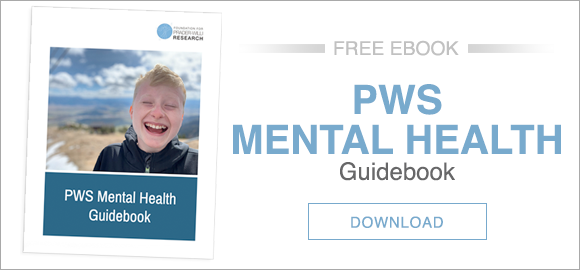 In our latest podcast, Lauren Schwartz-Roth, clinical psychologist and mom to a young adult with PWS, shares tips on how to stay calm and manage anxiety during COVID-19. To listen, just click above, or read below for a list of tips to start using today.
In our latest podcast, Lauren Schwartz-Roth, clinical psychologist and mom to a young adult with PWS, shares tips on how to stay calm and manage anxiety during COVID-19. To listen, just click above, or read below for a list of tips to start using today.
What COVID-19 Means for PWS Caregivers
There's so much anxiety and uncertainty around the rapidly evolving COVID-19 situation. As caregivers for people with PWS, we know that events like this can be even more challenging. It's difficult not only for the mental health of the person with PWS, who may not do well with change/uncertainty and have high levels of anxiety at baseline, but also for caregivers who are trying to cope with their child while also keeping themselves calm and functioning.
At the 2019 FPWR conference, Dr. Elisabeth Dykens gave a great talk about caregivers taking care of themselves — you can watch her presentation here. She shared several studies demonstrating that if we as caregivers take good care of ourselves, our kids do better. As flight attendants say, you need to put on your own oxygen mask first before you can help your kids. Our children are very sensitive and connected to their caregivers/parents and they take their cues from us. If we can stay calm, it helps our kids too.
So what can we as caregivers do to take care of ourselves during this time so we can be there for others who need us?
Actions You Can Take to 'Put Your Oxygen Mask On First'
- Gratitude. If you and your loved ones are currently in good health, remind yourself to feel gratitude about that. It can be easy to forget during the current health crisis.
- Practice physical distancing, not social distancing. Think about ways you and your kids can stay connected to others while also keeping everyone safe and healthy. This is a time when technology can really be our friend. It's a good time to connect and re-connect with friends and family via digital technologies. Call or FaceTime friends and family — don’t just text or post on social media. Use Skype, FaceTime, Zoom, or even the telephone (yes the iPhone actually works as a phone!). Facebook and Instagram are doing a number of live events and virtual social gatherings that could be a place to connect with others and have community. We want to feel connected and cared for. Social relationships are a key to feeling happier and to decrease stress, so find ways to help others, and yourself, not feel as isolated and lonely. Any connection is better than no connection. It may sound dramatic, but it really can help.
- Take care of your body. This is important for our mental and physical health and well being. Try to get a good night's sleep. “Unplug” for at least 30 minutes before you want to sleep. Read, listen to music, meditate (use a meditation app like CALM or Headspace). If you can't fall asleep right away, just enjoy the quiet rest. Even if you aren't asleep, your body is benefitting from the rest. Set a time during the day to write down your “worry thoughts” so they don’t keep you awake at night. Set a timer for 10 minutes and write down the thoughts. Then put it away, so that those thoughts can leave your mind. You can also help your body by getting out of bed at a reasonable hour each day. Eat food that nourishes you (but try to be aware if you are stress eating, and find another busy-task to do instead). Don't drink too much alcohol.
- Movement. Your regular exercise routine might be disrupted. Think about ways you can keep exercising and moving each day. If weather permits, go outside, take a walk or a run — you’ll get exercise as well as time in nature and fresh air. Or you can take advantage of online resources for exercise such as YouTube videos for yoga or cardio work-outs, try an exercise app, or even just turn on some music and dance for 15-20 minutes — your kids might like to join you. Do something active everyday. It will make a difference in how you feel and how you are coping.
- Be alert to potential information overload. We want to stay up-to-date with the latest news, but it's easy to get overwhelmed. To protect yourself from getting overwhelmed and agitated, put a limit on the amount of news and information you take in. Consider taking just one time a day to listen to or read a trusted news source. Or plan “day off” from news. Putting yourself in a "media bubble" even just for a few hours can help.
- Help others. One way to improve our mood is to help others in need. Look for ways to help others. Maybe they're lonely, and phone call would really help. Bring your neighbor that extra roll of toilet paper or Clorox wipes. This is a common treatment for people who are depressed but can be very helpful during times of anxiety as it reminds us we're not alone, and that we are a community.
- Continue with or create comforting routines. Most people have rituals or routines that help them feel grounded each day. These will likely be very helpful now, however right now, you won't be able to do many of your routines (e.g., go to the gym, connect with other moms at the school drop-off, go to your favorite coffee place). It's time to develop some new rituals that could give a sense of routine. Find ways to have activities through your day that help you feel grounded and calm. It might be having your morning coffee or cup of your favorite tea on your porch, taking a walk with your kids or reading a bedtime story or listening to some relaxing music with your children. Keep it simple. Stick to routines you enjoy. Routines help to make the world feel more predictable. And stick to a regular routine of getting dressed each morning, whatever is normal for you. Routines can also help your kids feel more grounded too.
For more tips on how to stay calm and manage anxiety during COVID-19, scroll to the top of this blog and click on the podcast.








